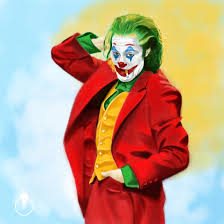About Jocker
The Joker, one of the most iconic villains in popular culture, epitomizes the archetype of chaos and anarchy in stark contrast to the heroic figures he often opposes. Introduced in the first issue of “Batman” in 1940, the Joker quickly became a staple of the Batman series, evolving over decades to reflect changing societal fears and fascinations. His character, with its grotesque appearance, maniacal laughter, and sadistic humor, serves as a symbol of unchecked madness and moral ambiguity, challenging the boundaries between sanity and insanity, order and disorder.
What makes the Joker particularly compelling is his complex psychology. Unlike many villains motivated by power, wealth, or revenge, the Joker’s actions are driven by a love for chaos and an insatiable desire to disrupt societal norms. This unpredictability makes him a formidable adversary to Batman, whose life is dedicated to the preservation of order and justice. The Joker’s lack of a definitive origin story further adds to his mystique. Various versions of his backstory exist, with the most famous being Alan Moore’s “The Killing Joke,” where the Joker is depicted as a failed comedian who turns to crime after a series of personal tragedies. This narrative, however, is just one of many, contributing to the character’s enigmatic nature and leaving audiences questioning the true roots of his madness.
The Joker’s influence extends beyond the pages of comic books into various media, including television, film, and video games. Portrayals by actors like Jack Nicholson, Heath Ledger, and Joaquin Phoenix have each brought unique interpretations to the character, highlighting different facets of his personality. Ledger’s performance in “The Dark Knight” is particularly noteworthy for its portrayal of the Joker as a nihilistic anarchist, which earned him a posthumous Academy Award. Phoenix’s interpretation in “Joker” offers a more humanized view, depicting his descent into madness and exploring themes of mental illness and societal neglect. These portrayals have contributed to the Joker’s lasting impact, resonating with audiences and sparking discussions about the nature of evil and the thin line separating heroism from villainy.
Moreover, the Joker’s relationship with Batman is central to his character. They represent two sides of the same coin: Batman embodies order, discipline, and justice, while the Joker represents chaos, unpredictability, and moral nihilism. This dynamic creates a fascinating narrative tension, as each character is defined by their opposition to the other. The Joker’s obsession with Batman, viewing their conflict as a twisted game, adds a psychological depth to their interactions, elevating their battles from mere physical confrontations to ideological clashes.
In essence, the Joker is more than just a comic book villain; he is a cultural icon who encapsulates the darkest aspects of human nature and the eternal struggle between order and chaos. His enduring appeal lies in his ability to adapt and remain relevant, continually reflecting and challenging contemporary societal issues, ensuring his place in the pantheon of timeless characters.

































































https://orell31.narod.ru/index/8-17006
https://www.freecodecamp.org/gwoodscapes
https://seekingalpha.com/user/60481551
https://www.virustotal.com/gui/user/gwoodscapes
https://community.clover.com/users/47098/gwoodscapes.html
https://bootstrapbay.com/user/praintreepark
https://www.myebook.com/user_profile.php?id=praintreepark
https://ie.pinterest.com/woodscapesg/
https://active.popsugar.com/@gwoodscapes/profile
https://www.pixiv.net/en/users/106756642
https://www.datacenter-insider.de/community/user/raintreeparkunits
https://www.mx6.com/members/raintreeparkunits.101402/
https://www.slmath.org/people/69580
https://forum.tomedo.de/index.php/user/praintreepark
https://www.jqwidgets.com/community/users/praintreepark/
https://answers.ea.com/t5/user/viewprofilepage/user-id/40816295
https://app.gitter.im/#/room/#somervilleunits:gitter.im
https://evermotion.org/portfolios/show/praintreepark/1509037
https://bestdirectorysite.com/author/prestige-raintree-park-6810/
http://fablero.ucoz.ru/index/8-155534
http://healingxchange.ning.com/profile/PrestigeSomerville139
https://us.community.sony.com/s/profile/005Dp000004cWZZ
https://www.nicovideo.jp/user/133170947
https://cq.ru/users/prestige-somerville
https://community.stencyl.com/index.php?action=profile;area=summary;u=1225059
https://www.tntxtruck.com/User-Profile/UserId/13667